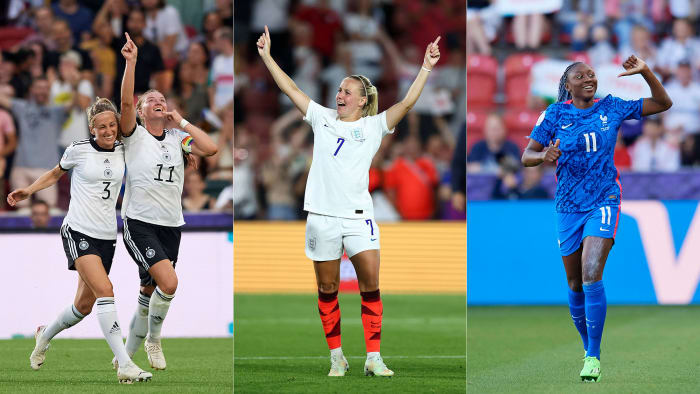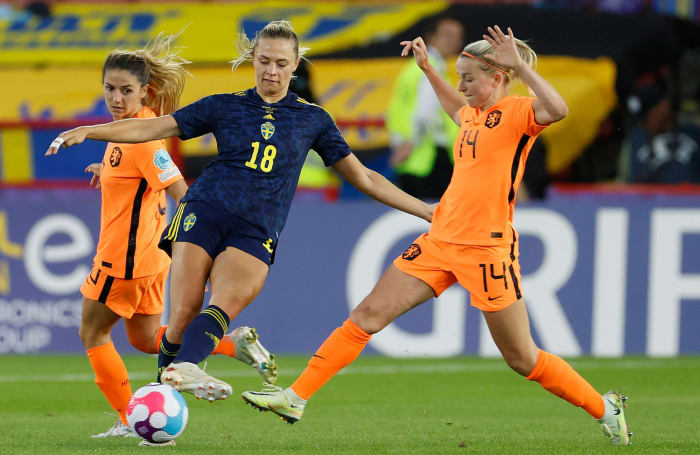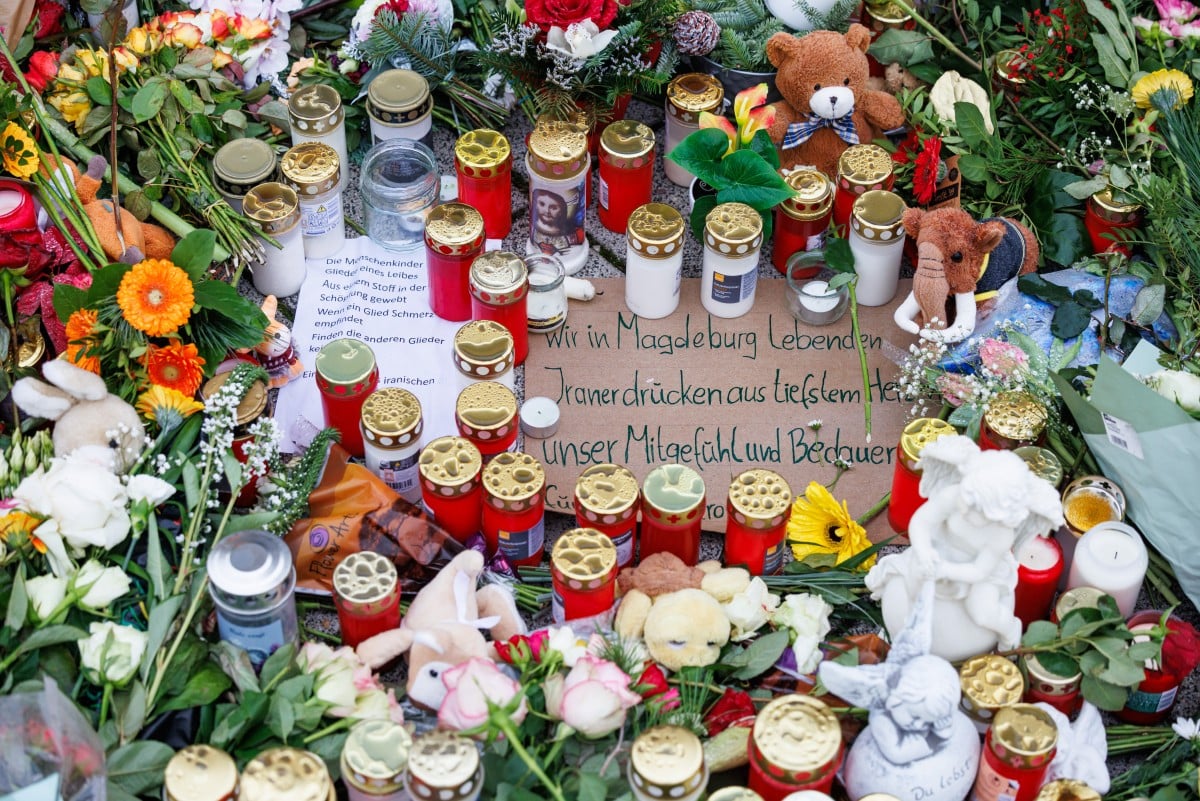The field at the Women’s European Championship has been whittled in half, and now the real fun begins.
Chalk and attrition have been the name of the game in England, where all of the favored sides have just about performed as expected, while a slew of big-name players have suffered long-term injuries or been sidelined by COVID-19. Amid that, the eight quarterfinalists have progressed to set up four tantalizing matchups and a knockout bracket that could go many ways.
The final eight begins with England vs. Spain and ends with another powerhouse matchup in France vs. Netherlands. In between Germany will face Austria while Sweden meets Belgium.
Some of those matchups could well come down to who is and isn’t available, though. Spain fulcrum Alexia Putellas and attacking star Jenni Hermoso were ruled out before the competition, with the former tearing her ACL on the eve of it, and while La Roja overcame a pair of early concessions and persevered through a tough group to reach the knockout stage, there’s a sense that its potential is capped. Facing the host nation with elimination stakes will certainly put that notion to the test.
Meanwhile, Netherlands captain and starting goalkeeper Sari van Veenendaal injured her shoulder and is out for the rest of the tournament, while scoring sensation Vivianne Miedema tested positive for COVID-19 and is in a race against time to return. Another star striker, Germany’s Lea Schüller, tested positive for the coronavirus as well and was forced to miss two group games.
The reigning champion Dutch’s next opponent is also missing a key piece, as France attacker Marie-Antoinette Katoto was the latest injury casualty, suffering a tournament-ending knee injury in a win over Belgium.
Being faced with adversity can often wind up being a catalyst, and for some of the tournament favorites, they’ll hope that is the case as opposed to the alternative, or else an abrupt exit could be in the offing while another continental power lifts the trophy. With the group stage in the books, here’s how the final eight teams standing rank heading into the elimination rounds:

Germany, England and France are among the last eight standing at the UEFA Women’s European Championship.
Imago Images (3)
1. Germany
The Germans haven’t been immune to the injury/COVID bug, as they were already fully aware they’d be without midfield ace Dzsenifer Marozsan after she tore her ACL in May, and Schüller only appeared in one group game, though she is out of quarantine and could return for the quarterfinals. But it’s been the availability of a player who has twice previously been forced to miss the European Championship stage that has made all the difference, with Alexandra Popp’s three goals leading the team’s otherwise balanced attack (seven scorers).
Faced with arguably the toughest group, Germany went a perfect 3-0-0 and outscored Spain, Denmark and Finland 9–0. Drawing the lowest-ranked team remaining in the competition is its reward, though the trade-off for that, should it stay to form, is a headlining semifinal against either France or the Netherlands. Regardless, after having its run of six straight Women’s Euros titles snapped by the Netherlands in 2017, Germany, especially with Schüller back in the fold, has the look of a side that could reclaim the crown—and put the world on notice heading into the 2023 Women’s World Cup (presuming it finishes off qualification as expected).
2. England
There’s not a whole lot that could have gone better for the Lionesses in the group stage, one in which it outscored opponents 14–0—the 8–0 rout of Norway was particularly stunning—and rolled to the final eight as one of two perfect sides. Sarina Wiegman’s first competition as coach has gone wonderfully, building on the run of form her side has had since her first match last September. In that time, England is unbeaten in 17 matches (15-0-2) and has outscored opponents 98–3 (Women’s World Cup qualifying has featured some incredibly lopsided scorelines).
Buoyed by home support and Beth Mead’s goals (tournament-leading five), England could well make it two European Championship finalists hosting at Wembley in as many summers. The problem is that Spain looms in the quarterfinals. It may not be full-strength Spain, but La Roja held England to a 0–0 draw in the Arnold Clark Cup in February and represent the first of three high hurdles for the Lionesses to clear in order to lift the trophy.
3. Sweden
The reigning Olympic silver medalists put an exclamation point on their group stage with a 5–0 thrashing of Portugal, finally resembling the group that entered the competition as UEFA’s top-ranked team (No. 2 in the world). The opener against the Netherlands, a 1–1 draw, was one of the best matches of the group stage, and while it didn’t result in three points, it gave the Swedes a sink-or-swim start to the competition.
Scroll to Continue
It may have taken a couple of games, but now they’re swimming smoothly, have a favorable quarterfinal bout and the look of a side that could play spoiler to the host, should that semifinal matchup come to fruition. After winning the inaugural competition in 1984, Sweden has managed three runner-up finishes (’87, ‘95, ’01), and another run to a final could be in the offing.
4. France
It’s a similar tale for Les Bleues: Corinne Diacre’s side has the talent, but does it have the ability to stay out of its way to realize its potential? Even after a group win over Belgium, Diacre claimed, “The problem is when we don’t manage to secure things, we start to doubt ourselves.” Between the mental capacity of the side that’s in England and the controversy lingering from the players who were not selected, there’s a wide range of outcomes here for a team that has lost in three straight quarterfinals on this stage.
On the other hand, since defeat on home soil to the U.S. in the 2019 Women’s World Cup quarterfinals, France has lost just once in 34 matches—also to the U.S.—and qualified for next summer’s World Cup. It has gone 1-0-1 against its quarterfinal opponent, the Netherlands, in that time as well. But would a fourth straight exit in the last eight really be a surprise, especially in the aftermath of Katoto’s injury?

Sweden and the Netherlands played to a draw in the group stage at the Women’s Euros.
Heiko Becker/HMB Media/Imago Images
5. Netherlands
The reigning European champions may yet have something to say about who wins this tournament. Despite van Veenendaal’s injury and Miedema’s absence, the Dutch have rallied to go through, though it took a great Daniëlle van de Donk goal vs. Portugal to avoid dropping points after blowing a 2–0 lead and a late flurry to emphatically put away Switzerland in an otherwise tense last group match.
“I’m really proud of the whole team how we have done this in the group,” veteran midfielder Sherida Spitse said after the Dutch clinched their knockout place. “This win makes us so strong, not only the starting 11 but also the players that are coming in and what kind of energy they are bringing in for us.”
Former NWSL manager Mark Parsons would certainly welcome back Miedema, the nation’s all-time leading scorer in international competition, against France in a match that has high-scoring potential.
6. Spain
Spain has recovered nicely after being dealt the devastating news that Alexia would miss the tournament, but Jorge Vilda’s side has a brutal draw, and he knows it.
“It’s the toughest matchup you can get in this Euro, with the level England have shown, the way they’ve been playing, being at home, the whole crowd behind them,” he said. “But it’s something that motivates us, we are a team that likes challenges.”
Taming England’s sizzling attack and enforcing its will over the host nation certainly qualify and will determine whether Spain is due for a third straight quarterfinal exit or its first semifinal appearance in 25 years.
7. Austria
A surprise group winner and semifinalist in its debut in 2017, Austria has made it back to the knockout stage, besting a disappointing Norway in their group finale for a place in the last eight. It also played England tight, falling just 1–0 in the opening match of the tournament—the second time in eight months it frustrated the Lionesses but came up short by that scoreline in official competition. Germany is rightly the favorite but should expect some staunch resistance from a side with clear limitations but a smart approach.
8. Belgium
Belgium’s women’s program is into new territory, having reached the knockout stage of a major competition for the first time after holding off Italy in a de facto qualifier for the quarterfinals. This European Championship is just the second tournament the Red Flames have ever qualified for, and they’re in position to potentially compete in a first World Cup next summer. All of that being said, there’s a massive gap in pedigree and quality when it comes to Belgium and Sweden, and while Ives Serneels’s side has been smart and stubborn, it’d take a substantial leap in quality of performance to reach the semis.
More Soccer Coverage:





















Discussion about this post